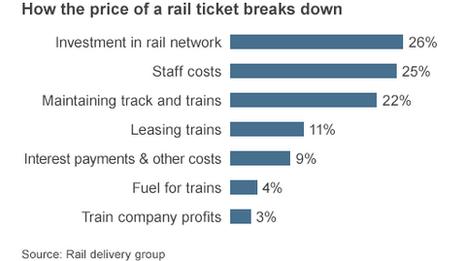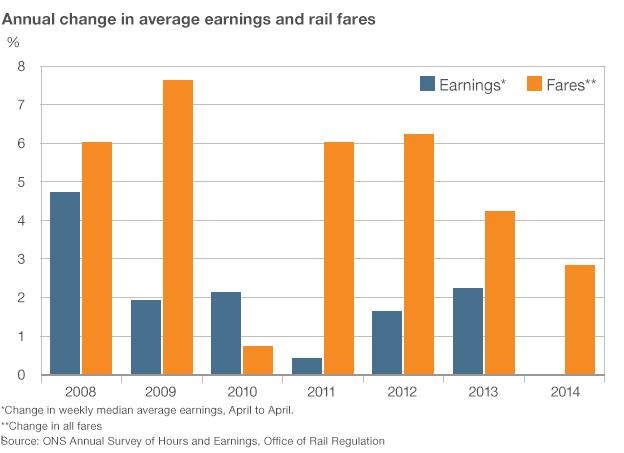Rail fare rise of 2.8% comes into effect
- Published
- comments
David Sidebottom, Passenger Focus: "Cost of running the railway is too high"
An average 2.8% increase in rail fares comes into effect on Thursday, pushing the cost of some commuter travel to more than £5,000 a year.
The increase is the smallest rise in four years, according to the pan-industry Rail Delivery Group.
Chancellor George Osborne said in last month's Autumn Statement he would keep fares in line with July's Retail Price Index (RPI) inflation rate of 3.1%.
But campaigners say that fares are rising three times faster than incomes.
'Concerns' recognised
Some regulated tickets, including season tickets, anytime and off-peak tickets, have risen on average by 3.1%.
The increase pushes the cost of some annual season tickets to more than £5,000 a year.
Transport Minister Stephen Hammond told the BBC: "Fares are rising but at the lowest they've ever done in the last decade and that's because this government recognises the concerns that people have about rail fares.
"Also this government is investing £16bn in the maintenance and upgrade of our railways over the next five years to ensure that there will be benefits for passengers like extra capacity."
Shadow transport secretary Mary Creagh said: "David Cameron's cost-of-living crisis continues as fares rise this week by up to 5%, while season tickets have gone up by 20% under this government, costing hard-working commuters hundreds of pounds.
"Over the last three years David Cameron has failed to stand up for working people, allowing train companies to hit passengers with inflation-busting fare rises of up to 9%."
Passengers travelling to London from Deal and Dover Priory will have to pay £5,012 annually, up from £4,864.
And the price of an annual season ticket from Basingstoke to London will now go up from £3,952 to £4,076.
Thomas Ableman from Chiltern Railways: Rail fares represent "good value for money"
Unregulated fares are not capped. But a number of these, typically off-peak leisure tickets - including some on the East Coast route - have gone up by much less than 3.1%.
Elsewhere in the UK:
Wales: Season tickets will go up by less than inflation, future average ticket rises to be in line with RPI inflation rate
Scotland: Regulated peak fares to be capped at RPI this year and next, regulated off-peak fares frozen
Northern Ireland: No planned rises
London: Transport for London fare rise delayed until 19 January
'Poorly served' passengers
Rail campaigners will be at London King's Cross station on Thursday, alongside Aslef train drivers' union leader Mick Whelan and RMT transport union head Bob Crow, calling for public ownership of the railways.
More than 50 Labour, Liberal Democrat, Green, Plaid Cymru and SNP MPs have signed a parliamentary motion calling for the renationalisation of the UK's railways.

TUC general secretary Frances O'Grady said: "Rail passengers and taxpayers are being poorly served by a privatised rail service that has failed to deliver any of the efficiency, investment and cost savings that privatisation cheerleaders promised.
"While the shareholders of the private train operating companies are doing well for themselves on the back of massive public subsidies, passengers are paying the highest share of their wages on rail fares in Europe.
"Rail passengers must wonder why they can't have the same cheap and more efficiently run state rail services that exist elsewhere in Europe."
But a Department for Transport spokesman said: "As a result of the economic policies that this government has put in place, the most recent forecasts from the Office for Budget Responsibility are that by around 2015, fares will be rising in line with wages and salaries."
'Prohibitively expensive'
The chancellor announced in his Autumn Statement in early December that the regulated fare price cap of RPI inflation plus 1% was being changed to RPI plus 0%.
Commuters on their journeys: "I have to stand up every day"
Jason Torrance, policy director of sustainable transport organisation Sustrans, said commuters would still feel the effects of the rise.
"The chancellor's move to bring an end to the inflation-busting fare rises we've seen over the last decade shows a recognition that rising transport costs are a barrier to economic recovery," he said.
"But commuters will still feel the pinch this new year because salaries aren't increasing by anywhere near the level of inflation.
"If transport remains so prohibitively expensive, we will continue to restrict travel choices and opportunities to access essential services and employment."
Transport Minister Stephen Hammond also commented on a plan to boost capacity by converting some first class carriages into standard class.
Earlier this month, First Great Western confirmed it was in talks with the Department for Transport about converting first class carriages on some of its services.
Mr Hammond said: "There are some new ideas we are looking at. This is one of them. Is it going to happen? It may. It may not."

- Published2 January 2014
- Published2 January 2014
- Published2 January 2014
- Published2 January 2014
- Published2 January 2014
- Published23 December 2013
- Published18 December 2013
- Published17 December 2013
- Published9 October 2013